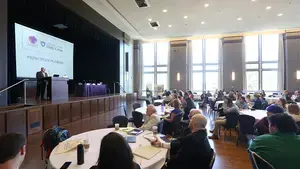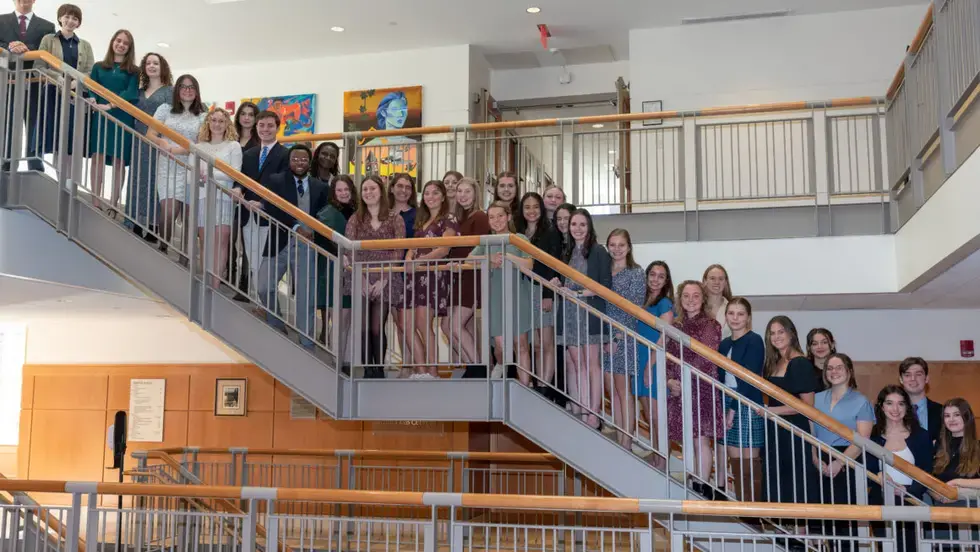
Peace and Conflict Studies

Areas of Study
Offered through the Center for Interdisciplinary Studies, students in the Peace and Conflict Studies program will learn to:
- Understand concepts fundamental to the study of peace and conflict.
- Recognize how different values (cultural, religious and philosophical) inform conflict and conflict resolution.
- Closely examine large-scale conflicts and their consequences.
- Critically evaluate the factors underlying structural violence (i.e., inequitable social arrangements and their impact on people).
- Analyze the lived experiences and perspectives of people involved in conflicts and efforts at reconciliation.
- Assess peace and conflict from the perspective of multiple disciplines and integrate different disciplinary approaches.
- Develop their capacity for self-awareness and recognize how their actions, or inaction, have implications for peace and conflict.
Requirements
Students can choose between two concentration tracks, the Standard track or the Social Justice track. Concentrators are required to complete six courses, including at least one course in each of the following categories.
Standard Track
Courses in this category examine the arguments of different ethical, religious or philosophical traditions on the conditions under which — if ever — war and violence may be justified. Courses include Philosophy on War and Peace, Christianity and Culture, Ethics and International Relations.
Courses in this category provide a detailed focus on a particular violent conflict or conflicts. Recent courses that would fulfill this requirement include, but are not limited to, Introduction to International Relations, Europe and the Superpowers 1939-1991 and The Civil Rights Movement.
Courses in this category examine social phenomena that are regular causes of conflict or violence, including poverty, ethnic conflict or racism. Courses that fulfill this requirement include Social Class and Power, Political Anthropology and Modern Latin America.
Guidelines
- Your concentration must include courses from three different departments.
- No more than two courses from your major, minor or other concentration may be counted for concentration credit.
- No more than three courses from any one department (excluding your major) may be counted for concentration credit.
- No more than one semester of Montserrat may be counted for concentration credit
- No more than two Study Abroad courses, with the director's permission, can be counted for concentration credit.
In addition to the above requirements, students interested in pursuing the Social Justice track, must take the following as part of the six-course and three-department requirements.
Social Justice Track
One Academic Internship (AI) in Worcester dealing with PCON issues or a Director-approved Washington or New York Semester Program internship. Alternately, with the Director's approval, relevant community-based learning (CBL) and other experiential learning experiences that are not already counted as Category 1 or Category 3 courses may be considered as alternatives for the AI. In this case, the student would need to complete an additional Category 1 or Category 3 course to fulfill the AI requirement.
One Senior Seminar on Social Justice (CISS 310: Seeking Justice), taken in the second semester of the student's Senior year. If this course is not offered in an academic year, alternate courses may be considered to fulfill this requirement.
Meet Your Director

How to Declare
You may become a Peace and Conflict Studies concentrator at any time until the end of the second semester of your junior year, or at the director's discretion. After enrolling in the concentration, please contact the director to set up an appointment.
To declare the concentration:
- On the STAR system, under My Academics, click on the Change of Academic Plan. Under the Student Forms and Flows heading, click on Declare Major/Minor/Concentration and follow the instructions for declaring the concentration.
Opportunities
Academic Achievement Award
Each year the achievements of an outstanding senior concentrator are recognized with the Hampsch Award. The award is based on the GPA in Peace and Conflict Studies courses and a 10-30-page paper either completed in a Peace and Conflict Studies course or as part of a departmental or honors thesis.
Lecture & Panel Series
These events incorporate a diverse range of perspectives, from academic experts to affected populations like asylees and from international to local dimensions. In recent years, programming has included: a panel on humanitarian intervention in Syria, a high-profile lecture on the Islamic State, a panel on LGBTQ asylum seekers and a talk on race and the criminal justice system.
Research
As part of the concentration, students can participate in research, either on or off campus. Every spring, Peace and Conflict Studies sponsors sessions at the Academic Conference to provide concentrators the opportunity to showcase their research. Recent research topics include: The Future of the American Nuclear Arsenal, We the People: The UN, States and the Search for Peace, Sumanahalli: Mind, Body and Spirit and Assessing the Legality of China’s Claims in the South China Sea.
Worcester World Affairs Council
Since 2017, the Peace and Conflict Studies Program, with support from the Holy Cross Office of Government and Community Relations, has funded student participation in the Worcester World Affairs Council (WWAC). WWAC is a non-profit organization affiliated with the World Affairs Councils of America. Its members meet monthly at the Worcester Club, for lectures by experts in international affairs.
The Peace and Conflict Studies concentration will enhance your capacity for global citizenship
In a 21st century world marked by the persistence of violent conflict, informed citizenship requires an understanding of common causes of war and conflict and their effects on individuals and communities. It also demands engagement with moral and ethical questions about peace and conflict, including an examination of methods by which conflict can be prevented or peacefully resolved.







